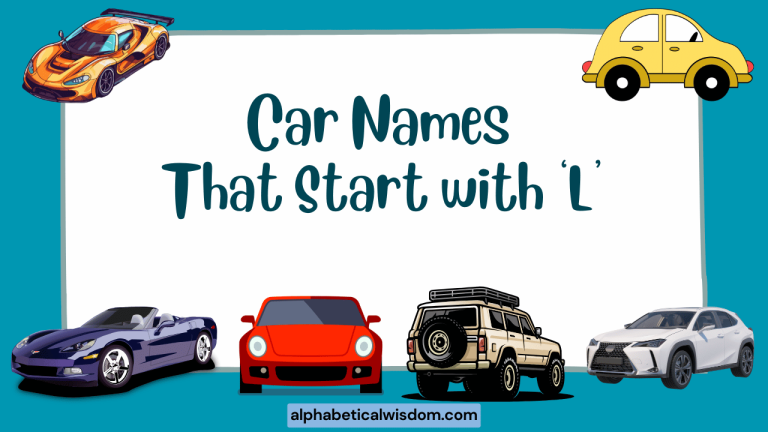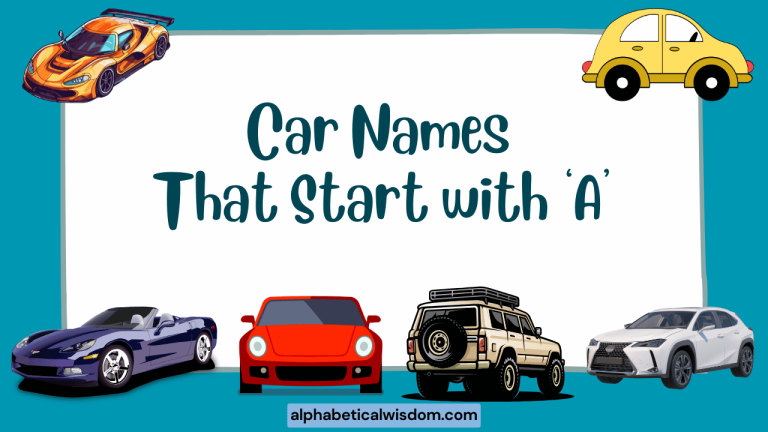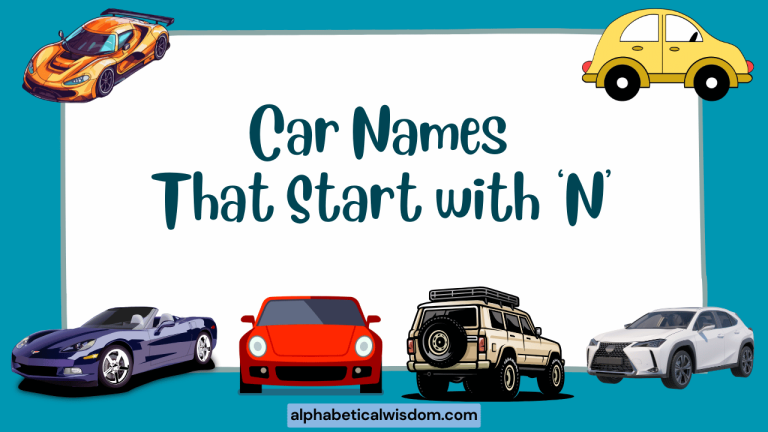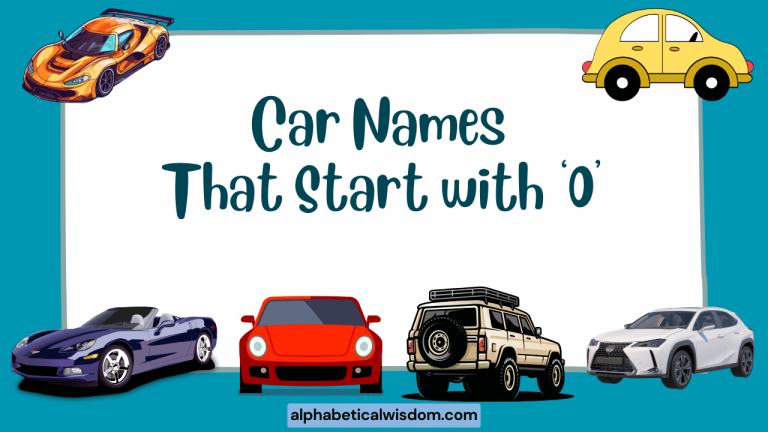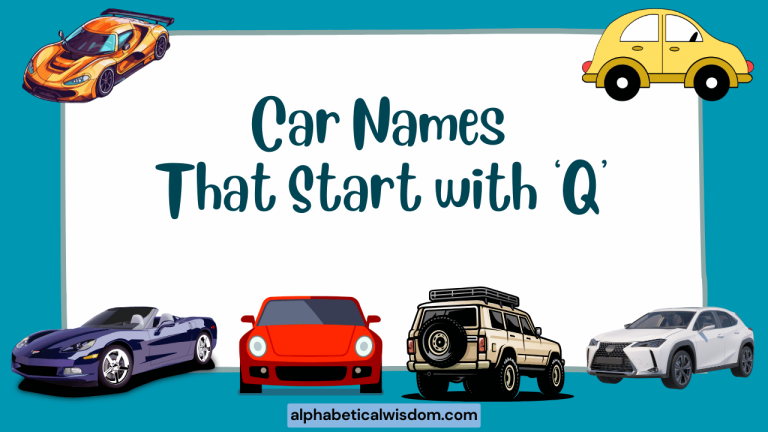Car Names That Start With “I”: A Grammatical Exploration
Exploring car names that begin with the letter “I” provides a fascinating lens through which to examine English grammar and naming conventions. While seemingly niche, this topic allows us to delve into the nuances of noun usage, proper nouns, and the creative application of language in branding.
Understanding how these names function grammatically enhances our overall comprehension of English and its adaptability. This guide is designed for English language learners, grammar enthusiasts, and anyone curious about the intersection of language and automotive branding.
Table of Contents
- Introduction
- Definition: Car Names and Proper Nouns
- Structural Breakdown of Car Names
- Types and Categories of Car Names Starting with “I”
- Examples of Car Names Starting with “I”
- Usage Rules for Car Names
- Common Mistakes When Using Car Names
- Practice Exercises
- Advanced Topics: Etymology and Brand Identity
- FAQ: Frequently Asked Questions
- Conclusion
Definition: Car Names and Proper Nouns
A car name, in the context of grammar, functions primarily as a proper noun. Proper nouns are specific names for people, places, or things, and they are always capitalized in English. Car names distinguish one vehicle model from another within a brand or across different manufacturers. They serve as identifiers and are crucial for communication about specific vehicles. For example, “Impala” is a proper noun referring to a specific model of Chevrolet car.
The function of a car name extends beyond simple identification. It often carries connotations intended to evoke specific feelings or associations in potential buyers.
A car name might suggest speed, luxury, reliability, or adventure. These connotations are carefully chosen to align with the target market and the overall brand image.
Consider the “Infiniti,” a name designed to suggest limitless possibilities and upscale performance.
In the broader context of English grammar, understanding how car names function as proper nouns contributes to a stronger grasp of noun classification. Recognizing proper nouns and their capitalization rules is fundamental for clear and accurate writing.
Moreover, the study of car names can also touch upon aspects of semantics, as the meaning and implications of these names are deliberately crafted to influence consumer perception.
Structural Breakdown of Car Names
The structural breakdown of car names involves examining their composition and grammatical elements. Car names can be single words, compound words, or phrases.
Single-word names, like “Isetta,” are straightforward and typically function as simple proper nouns. Compound names, such as “Interceptor,” combine two or more words to create a new, often more descriptive, identifier.
Phrasal names are less common but may consist of a brand name followed by a model identifier.
Analyzing the morphological structure of car names can reveal interesting insights. For example, many car names ending in “-a” or “-i” (like “Impreza” or “Infiniti”) have roots in Latin or Italian, languages known for their aesthetic appeal and association with luxury and performance.
The choice of such endings can contribute to the perceived elegance and sophistication of the vehicle.
Furthermore, the phonetic structure of car names is carefully considered. Manufacturers often choose names that are easy to pronounce and remember across different languages and cultures.
This is especially important for brands with a global presence. The sound of a car name can also influence its perceived qualities; for instance, a name with hard consonants might suggest power and robustness, while a name with softer sounds might evoke a sense of smoothness and refinement.
Types and Categories of Car Names Starting with “I”
Descriptive Names
Descriptive car names directly convey a characteristic or attribute of the vehicle. These names aim to provide potential buyers with an immediate understanding of the car’s capabilities or intended use.
For example, a descriptive name might indicate the car’s size, performance, or target market segment. These names are often straightforward and easily understood.
Evocative Names
Evocative car names aim to create a specific feeling or association in the minds of consumers. These names are less literal than descriptive names and rely more on suggestion and emotional appeal.
They might evoke a sense of adventure, luxury, or power. Evocative names are often chosen to differentiate a car from its competitors and create a strong brand identity.
Compound Names
Compound car names combine two or more words to create a new identifier. These names can be descriptive, evocative, or a combination of both.
Compound names offer manufacturers more flexibility in conveying the desired message about the vehicle. They can also be used to create a unique and memorable brand identity.
For example, a compound name might combine a brand name with a performance descriptor.
Examples of Car Names Starting with “I”
The following tables provide examples of car names starting with the letter “I”, categorized by their apparent intention (descriptive, evocative, or other). Each table includes a brief analysis of the name’s potential connotations and grammatical function.
Table 1: Examples of Car Names Starting with “I”
This table showcases various car names starting with “I.” Each entry includes the car name, the manufacturer, and notes on the name’s potential connotations and grammatical function.
| Car Name | Manufacturer | Notes |
|---|---|---|
| Isetta | BMW | Diminutive suffix “-etta” suggests small size. Functions as a proper noun. |
| Impala | Chevrolet | Evokes agility and grace through association with the African antelope. Proper noun. |
| Integra | Acura | Implies integration and completeness. Proper noun. |
| Intrepid | Dodge | Evokes boldness and fearlessness. Proper noun. |
| Infiniti | Infiniti | Suggests limitless possibilities and upscale performance. Proper noun. |
| i-MiEV | Mitsubishi | “i” likely stands for “innovation” or “intelligent.” MiEV stands for Mitsubishi innovative Electric Vehicle. Proper noun. |
| Ignis | Suzuki | Latin for “fire,” suggesting energy and passion. Proper noun. |
| Innova | Toyota | Implies innovation and advancement. Proper noun. |
| Inspire | Honda | Suggests aspiration and motivation. Proper noun. |
| Insight | Honda | Implies understanding and forward-thinking technology. Proper noun. |
| Ikon | Ford | Suggests iconic status and recognizability. Proper noun. |
| Identity | Volkswagen | Emphasizes brand identity and recognition. Proper noun. |
| Imperia | Minerva | Suggests luxury and power. Proper noun. |
| Indy | Various (race cars) | Short for Indianapolis, associated with racing. Proper noun. |
| Interceptor | Jensen/Ford | Evokes speed and pursuit. Proper noun. |
| Illusion | Hyundai | Suggests a dreamlike, desirable quality. Proper noun. |
| i3 | BMW | “i” likely stands for “innovation.” The number denotes series. Proper noun. |
| i8 | BMW | “i” likely stands for “innovation.” The number denotes series. Proper noun. |
| i4 | BMW | “i” likely stands for “innovation.” The number denotes series. Proper noun. |
| iX | BMW | “i” likely stands for “innovation.” “X” signifies SUV. Proper noun. |
| Isis | Toyota | Named after Egyptian Goddess. Proper noun. |
| Iroc | Chevrolet | “IROC” stands for International Race of Champions. Proper noun. |
| Izusu | Izusu | Japanese manufacturer name. Proper noun. |
Table 2: Analysis of Descriptive vs. Evocative Names
This table categorizes the car names from Table 1 into descriptive and evocative types, providing a comparative analysis of their intended effects.
| Descriptive Names | Evocative Names |
|---|---|
| i-MiEV (Mitsubishi innovative Electric Vehicle) | Impala (Agility, grace) |
| Integra (Completeness, integration) | |
| Intrepid (Boldness, fearlessness) | |
| Infiniti (Limitless possibilities) | |
| Ignis (Energy, passion) | |
| Innova (Innovation) | |
| Inspire (Aspiration, motivation) | |
| Insight (Understanding, forward thinking) | |
| Ikon (Iconic status) | |
| Identity (Brand recognition) | |
| Imperia (Luxury and power) | |
| Interceptor (Speed and pursuit) | |
| Illusion (Dreamlike quality) | |
| Iroc (Racing) |
Table 3: Car Names with Numerical or Alphanumeric Components
This table highlights car names that incorporate numbers or alphanumeric combinations, discussing their significance and grammatical peculiarities.
| Car Name | Manufacturer | Notes |
|---|---|---|
| i3 | BMW | “i” for innovation, “3” denotes series. Alphanumeric, proper noun. |
| i8 | BMW | “i” for innovation, “8” denotes series. Alphanumeric, proper noun. |
| i4 | BMW | “i” for innovation, “4” denotes series. Alphanumeric, proper noun. |
| iX | BMW | “i” for innovation, “X” signifies SUV. Alphanumeric, proper noun. |
| i-MiEV | Mitsubishi | “i” likely stands for “innovation” or “intelligent.” MiEV stands for Mitsubishi innovative Electric Vehicle. Proper noun. |
Table 4: Examples of Car Model Naming Conventions
This table showcases different naming conventions car manufacturers use, providing diverse examples. It highlights the variety of strategies employed in branding.
| Naming Convention | Example | Description |
|---|---|---|
| Animal Names | Impala (Chevrolet) | Using animal names to evoke qualities associated with the animal (e.g., speed, agility). |
| Descriptive Adjectives | Intrepid (Dodge) | Employing adjectives to describe the car’s intended characteristics (e.g., bold, fearless). |
| Abstract Concepts | Infiniti (Infiniti) | Utilizing abstract concepts to suggest broader ideas or aspirations (e.g., limitless possibilities). |
| Geographical Locations | Indy (Various) | Referencing geographical locations to associate the car with a particular place or event (e.g., Indianapolis). |
| Technological Terms | i-MiEV (Mitsubishi) | Using technological terms to highlight the car’s advanced features (e.g., innovative Electric Vehicle). |
| Classical References | Isis (Toyota) | Referencing classical deities or historical figures to imbue the car with prestige or historical significance. |
| Acronyms | Iroc (Chevrolet) | Using acronyms to represent a series or racing league. |
| Numerical/Alphanumeric | i3 (BMW) | Using numbers or alphanumeric combinations to denote series or feature sets. |
Usage Rules for Car Names
The primary usage rule for car names is that they are proper nouns and must always be capitalized. This applies regardless of whether the name is a single word, compound word, or phrase. Correct capitalization is essential for clarity and grammatical accuracy. For example, writing “impala” instead of “Impala” is grammatically incorrect.
When referring to a specific car model, it is common to include the manufacturer’s name before the model name. This provides additional context and avoids ambiguity, especially when the same model name is used by different manufacturers.
For instance, “Chevrolet Impala” clearly identifies the specific car being discussed.
In formal writing, it is generally recommended to use the full car name, including the manufacturer’s name and any trim levels or special editions. However, in informal contexts, it is acceptable to use just the model name, provided that the context makes it clear which car is being referred to.
For example, in a conversation about Chevrolet cars, it would be acceptable to simply say “Impala” instead of “Chevrolet Impala.”
The use of articles (a, an, the) with car names depends on the context. When referring to a specific car, the definite article “the” is used. For example, “The Impala is a classic car.” When referring to cars in general, no article is needed. For example, “Impala cars are known for their style.”
Common Mistakes When Using Car Names
One of the most common mistakes is failing to capitalize car names. Since they are proper nouns, capitalization is mandatory. Incorrect: “I saw an impala on the road.” Correct: “I saw an Impala on the road.”
Another frequent error is using the wrong article or omitting it altogether. Incorrect: “He drives Impala.” Correct: “He drives an Impala” (if referring to any Impala) or “He drives the Impala” (if referring to a specific Impala).
Incorrect: “The Isetta is small.” Correct: “The Isetta is small.”
Misspelling car names is also a common mistake, especially with less familiar models. It’s important to double-check the spelling, particularly when writing formally.
Incorrect: “Infinniti” Correct: “Infiniti”
Using lowercase letters in a car model name is incorrect. Consider the following table:
| Incorrect | Correct |
|---|---|
| i-miev | i-MiEV |
| i 3 | i3 |
Practice Exercises
Exercise 1: Capitalization
Correct the capitalization in the following sentences.
| Question | Answer |
|---|---|
| 1. i want to buy an infiniti. | 1. I want to buy an Infiniti. |
| 2. the chevrolet impala is a classic car. | 2. The Chevrolet Impala is a classic car. |
| 3. he drives a bmw i3. | 3. He drives a BMW i3. |
| 4. my friend owns an isetta. | 4. My friend owns an Isetta. |
| 5. the dodge intrepid was a popular model. | 5. The Dodge Intrepid was a popular model. |
| 6. she is saving up for a toyota innova. | 6. She is saving up for a Toyota Innova. |
| 7. i saw an izusu truck yesterday. | 7. I saw an Isuzu truck yesterday. |
| 8. the ford ikon is a compact car. | 8. The Ford Ikon is a compact car. |
| 9. there was a bmw ix parked outside. | 9. There was a BMW iX parked outside. |
| 10. he raced an iroc in the 80s. | 10. He raced an Iroc in the 80s. |
Exercise 2: Identifying Proper Nouns
Identify the proper nouns (car names) in the following sentences.
| Question | Answer |
|---|---|
| 1. The Infiniti Q50 is a luxury sedan. | 1. Infiniti Q50 |
| 2. My neighbor drives a Chevrolet Impala. | 2. Chevrolet Impala |
| 3. The BMW i8 is a hybrid sports car. | 3. BMW i8 |
| 4. I saw a vintage Isetta at the car show. | 4. Isetta |
| 5. Dodge Intrepid was known for its spacious interior. | 5. Dodge Intrepid |
| 6. The Toyota Innova is popular in Asia. | 6. Toyota Innova |
| 7. Isuzu is a Japanese automobile manufacturer. | 7. Isuzu |
| 8. The Ford Ikon was a popular choice in some markets. | 8. Ford Ikon |
| 9. BMW iX is an electric SUV | 9. BMW iX |
| 10. The Chevrolet Iroc was a popular racing car. | 10. Chevrolet Iroc |
Exercise 3: Article Usage
Fill in the blanks with the correct article (a, an, the) or leave blank if no article is needed.
| Question | Answer |
|---|---|
| 1. He owns _______ Infiniti. | 1. an |
| 2. _______ Impala is a comfortable car. | 2. The |
| 3. She wants to buy _______ i3. | 3. an |
| 4. _______ Isetta is a very small car. | 4. The |
| 5. They are driving _______ Intrepid. | 5. the |
| 6. _______ Innova is a popular family car in some countries. | 6. The |
| 7. He is a fan of _______ Isuzu trucks. | 7. Isuzu |
| 8. She used to drive _______ Ford Ikon. | 8. a |
| 9. _______ BMW iX is considered a great electric car. | 9. The |
| 10. _______ Chevrolet Iroc was a popular sports car in the 80s. | 10. The |
Advanced Topics: Etymology and Brand Identity
Delving into the etymology of car names reveals fascinating insights into the marketing strategies and cultural influences that shape automotive branding. Many car names have roots in Latin, Greek, or other languages, chosen for their connotations and aesthetic appeal.
For example, “Impala” derives from the name of a graceful African antelope, suggesting speed and agility. Understanding these etymological connections enhances our appreciation of the deliberate choices made by car manufacturers.
The relationship between car names and brand identity is also a complex and nuanced topic. Car names are carefully selected to align with the overall brand image and target market.
A luxury brand might choose names that evoke sophistication and exclusivity, while a sports car brand might opt for names that suggest power and performance. The consistency between car names and brand identity is crucial for building brand recognition and customer loyalty.
Furthermore, the evolution of car names over time reflects changing consumer preferences and cultural trends. As technology advances and new market segments emerge, car manufacturers adapt their naming strategies to stay relevant and appeal to new audiences.
Studying these trends provides valuable insights into the dynamics of the automotive industry and the ever-evolving landscape of consumer culture.
FAQ: Frequently Asked Questions
Q1: Why are car names capitalized?
A1: Car names are capitalized because they are proper nouns, which are specific names for particular things, in this case, specific car models. Proper nouns always require capitalization in English.
Q2: Do I always need to include the manufacturer’s name when referring to a car model?
A2: While not always mandatory, including the manufacturer’s name provides clarity and avoids ambiguity. In formal writing, it’s generally recommended.
In informal contexts, it’s acceptable to omit the manufacturer’s name if the context is clear.
Q3: How do car manufacturers choose car names?
A3: Car manufacturers employ a variety of strategies, including choosing names that are descriptive, evocative, easy to pronounce, and align with the brand’s image and target market. They often conduct extensive market research to test the appeal of different names.
Q4: What is the difference between a descriptive and an evocative car name?
A4: A descriptive car name directly conveys a characteristic or attribute of the vehicle, while an evocative car name aims to create a specific feeling or association in the minds of consumers.
Q5: Are there specific rules about using numbers or letters in car names?
A5: There are no strict rules, but manufacturers often use numbers or letters to denote series, engine size, or other technical specifications. These alphanumeric combinations are also considered part of the proper noun and must be capitalized accordingly.
Q6: What should I do if I’m unsure about the correct spelling of a car name?
A6: Always double-check the spelling, especially in formal writing. You can consult the manufacturer’s website or reliable automotive resources to confirm the correct spelling.
Q7: Why do some car names sound foreign?
A7: Many car names have roots in Latin, Italian, or other languages known for their aesthetic appeal and association with luxury or performance. This is a deliberate choice to enhance the perceived qualities of the vehicle.
Q8: Are car model names trademarked?
A8: Yes, car model names are typically trademarked to protect the manufacturer’s brand identity and prevent other companies from using the same name.
Q9: How important is a car’s name to its success?
A9: The name of a car is critical to its success. It is one of the first things potential buyers notice and can heavily influence perceptions of the vehicle.
A well-chosen name can contribute significantly to brand recognition and sales.
Q10: Can a car model have the same name across different manufacturers?
A10: While it’s uncommon due to trademark laws, it is possible, especially if the vehicles are in different markets or segments. However, manufacturers usually avoid this to prevent confusion.
Conclusion
Understanding car names that start with the letter “I” provides a valuable exercise in applying English grammar rules, particularly those related to proper nouns and capitalization. By examining the etymology, structure, and usage of these names, we gain a deeper appreciation for the role of language in branding and marketing.
Remember to always capitalize car names, use appropriate articles, and double-check spellings for accuracy.
Continue to explore the world of car names and their grammatical nuances. This knowledge will not only enhance your understanding of English but also provide a unique perspective on the automotive industry and its creative use of language.
Keep practicing, and you’ll become more confident in your ability to use car names correctly and effectively.

